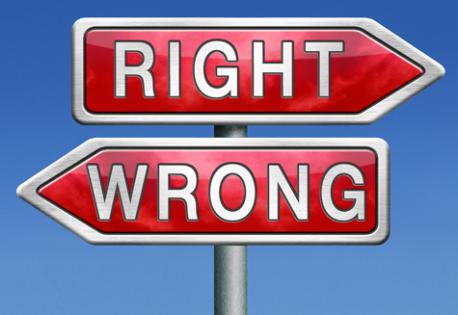Perhaps it's our convict past that means we try to get away with what we can, but perhaps our own attitude and behaviour might explain why some children have trouble understanding 'right' from wrong'.
That's one conclusion that can be drawn from research by Paula Dootson of QUT Business School who has studied the ongoing issue of consumer misbehaviour.
She says that matters such as grazing on grapes at the supermarket, forgetting your transport card but still riding on public transport for nothing and returning a dress that has only been worn once are common consumer actions which many people think are "trivial".
But Ms Dootson says it leaves many businesses short-changed because it depends on where individuals draw the line between what is right and what is wrong.
"As a society we can agree on the polar opposites - what is acceptable and what isn't - but when it comes to everything in-between, the line blurs on what is right and what is wrong."
She says that in a survey where consumers were asked to rank specific behaviours in the order of acceptability, two of the top five 'acceptable' behaviours were, in fact, illegal.
One is creating a fake iTunes account to obtain material not available in Australia and the other illegally downloading television programs for free from the internet for personal consumption.
"It's not surprising that people differentiate between the neutral behaviour of using a 4-cent per litre petrol voucher and the totally illegal behaviour of using a stolen credit card to buy goods.
"But what is surprising is that people feel quite comfortable with breaking the law in respect of obtaining entertainment and other material via iTunes and other providers. It takes time and effort to do this also as it's not easy to create a fake account.
Other behaviours ranked in the top 5 acceptable behaviours were paying for two people to stay in a holiday apartment when there was really four, or lying when returning merchandise to a store.
Ms Dootson says customer theft accounts for 45% of all losses incurred by organisations, and cost the retail industry almost $2 billion in 2012-13.
"While the impact of illegal behaviours is easy to quantify, it is difficult to measure the effect of deviant but not illegal consumer behaviours, such as lying," she said.
Ms Dootson's research also looks at what businesses could do to deter consumers from deviant behaviour.
"Current deterrence measures assume we are all rational beings, but we are not, and we don't always weigh up the costs and benefits of our actions," she said.
"What businesses need to do is tailor deterrence strategies that counter the justifications people use to convince themselves a behaviour is acceptable.
"For example, attacking people's justification that it is acceptable to graze on grapes at the supermarket because 'everyone else does it', or 'it isn't hurting anyone', or 'I won't get caught'," she said.
"If businesses can convince consumers that their misbehaviour is hurting someone, is not normal practice, or is morally wrong then consumers are more likely to change their bad habits."
How people ranked consumer behaviours based on acceptability (1 = most acceptable, 10 = least acceptable) - Do you agree?
1. Using the 4 cent a litre fuel voucher from the grocery store to buy petrol
2. Creating a fake US iTunes account to access and pay for content not available in Australia - illegal
3. Returning merchandise to a store by claiming it was a gift when it was not
4. Saying there are two people staying in a holiday apartment when there are really four - organisational policy violation
5. Illegally downloading TV shows from the internet for free, for personal consumption - illegal
6. Lying about a child's age in order to get a lower price - organisational policy violation
7. Not saying anything when the waitress miscalculates the bill in your favour
8. Evading a fare on public transport - illegal
9. Reporting a lost item as 'stolen' to an insurance company to collect the money - illegal
10. Using a stolen credit cards to order goods over the internet - illegal



















__small.png)










